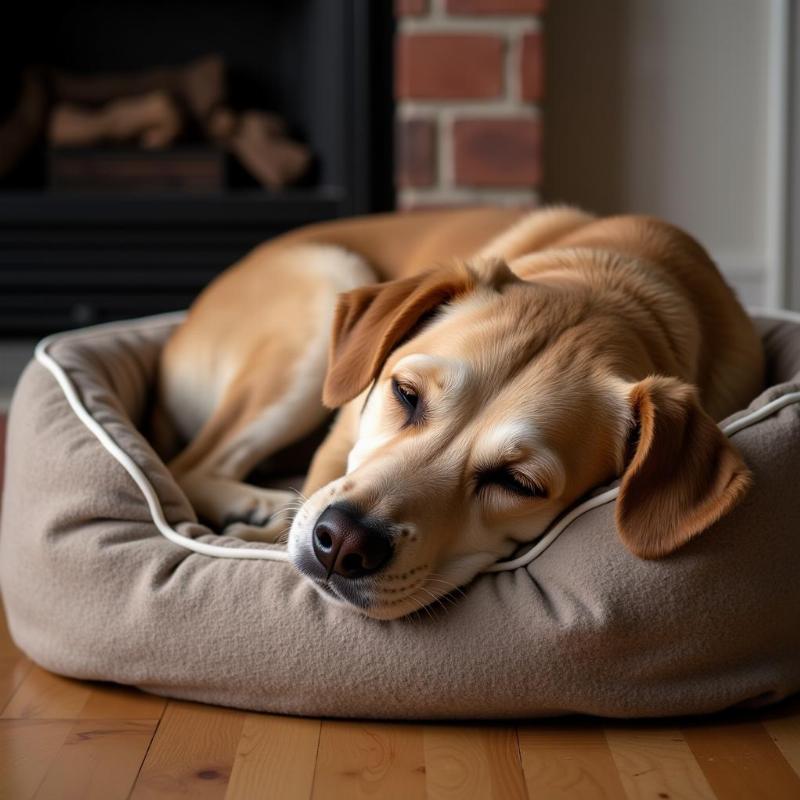If your senior dog suddenly starts pacing at night, it can be concerning. This behavior, often referred to as “sundowning,” can disrupt your pet’s sleep and yours. Understanding why your old dog paces at night is the first step to finding solutions and restoring peaceful nights for both of you. This article explores the common causes, diagnostic approaches, and effective management strategies for nighttime pacing in older dogs.
Understanding Why Your Old Dog Paces at Night
Several factors can contribute to nighttime pacing in senior dogs. These range from medical conditions to environmental changes and behavioral issues. Identifying the underlying cause is crucial for effective treatment.
Medical Reasons for Pacing
- Cognitive Dysfunction Syndrome (CDS): Similar to Alzheimer’s in humans, CDS can cause confusion, disorientation, and anxiety, leading to pacing, especially at night.
- Pain: Arthritis, other joint issues, or internal discomfort can make it difficult for your dog to settle down. Pacing may be a way to relieve some of the pain.
- Vision or Hearing Loss: Sensory decline can make older dogs feel insecure, especially in low-light conditions, prompting them to pace.
- Medical Conditions Affecting the Nervous System: Neurological disorders can disrupt sleep patterns and cause restlessness.
Environmental and Behavioral Factors
- Anxiety: Changes in routine, new pets, loud noises, or even thunderstorms can trigger anxiety and pacing.
- Lack of Exercise: Insufficient physical and mental stimulation during the day can lead to pent-up energy and restlessness at night.
- Boredom: Senior dogs, especially those less active, can get bored easily, leading to pacing as a way to occupy themselves.
- Loss of House Training: Age-related incontinence can cause discomfort and the need to frequently get up and move around.
Diagnosing the Cause of Nighttime Pacing
If your old dog starts pacing at night, a visit to your veterinarian is essential. The vet will conduct a thorough physical exam, review your dog’s medical history, and may recommend blood tests, urine analysis, or X-rays to rule out underlying medical conditions. Be prepared to provide detailed information about your dog’s behavior, including when the pacing started, how often it occurs, and any other associated symptoms.
Managing Nighttime Pacing in Your Senior Dog
Once the underlying cause is identified, your veterinarian can recommend appropriate management strategies.
Medical Treatments
- Medication: For CDS, pain, or anxiety, your veterinarian may prescribe medication to help manage the symptoms.
- Pain Management: Addressing underlying pain through medication, supplements, or therapies like acupuncture can significantly reduce pacing.
is cedar shavings safe for dogs
Environmental and Behavioral Modifications
- Creating a Calm Environment: A quiet, comfortable sleeping area with a familiar bed and low lighting can help reduce anxiety and promote relaxation. Consider using a white noise machine or playing calming music.
- Establishing a Regular Routine: Consistent feeding times, walks, and bedtime routines can provide a sense of security and reduce anxiety.
- Providing Mental and Physical Enrichment: Regular exercise, puzzle toys, and interactive play can help tire your dog out during the day and reduce restlessness at night.
- Managing Incontinence: If incontinence is a factor, frequent potty breaks and absorbent bedding can help manage the issue and improve comfort.
 Chó già ngủ yên
Chó già ngủ yên
Conclusion
Nighttime pacing in older dogs can be a sign of an underlying medical or behavioral issue. Identifying the cause and implementing appropriate management strategies are crucial for improving your dog’s quality of life and restoring peaceful nights for both of you. Don’t hesitate to consult your veterinarian if your old dog exhibits this behavior. Early diagnosis and intervention can make a significant difference.
FAQ
- Q: Is nighttime pacing always a sign of a serious problem? A: While pacing can indicate a medical condition, it can also be due to anxiety or boredom. A veterinary checkup is recommended to determine the cause.
- Q: Can diet affect nighttime pacing? A: A balanced diet is essential for overall health, but specific dietary changes are unlikely to directly impact pacing.
- Q: How can I make my dog’s sleeping area more comfortable? A: Provide a soft, supportive bed in a quiet area with dim lighting. A familiar blanket or toy can also help.
- Q: What kind of exercise is appropriate for a senior dog? A: Short walks, gentle play sessions, and mental stimulation activities are good options. Consult your veterinarian for specific recommendations.
- Q: How can I manage my dog’s anxiety at night? A: Creating a calming routine, using calming aids like pheromone diffusers, and consulting with a veterinary behaviorist can be helpful.
- Q: Should I confine my dog to a crate at night if they are pacing? A: Crating may increase anxiety. Consult your veterinarian or a certified dog trainer for advice on managing nighttime behavior.
- Q: Are there any over-the-counter medications I can give my dog for pacing? A: Never give your dog any medication without consulting your veterinarian.
how to clean dog pee off concrete
indoor dog fence for large dogs
Beautdogs.us is your trusted source for comprehensive and engaging information on all aspects of dog care, breeds, and lifestyle in the US. We cater to both new and experienced dog owners, offering expert advice and valuable resources. From understanding your dog’s behavior to selecting the right products, Beautdogs.us is your go-to resource. For any inquiries, contact us at [email protected] or +1 501-555-7529.